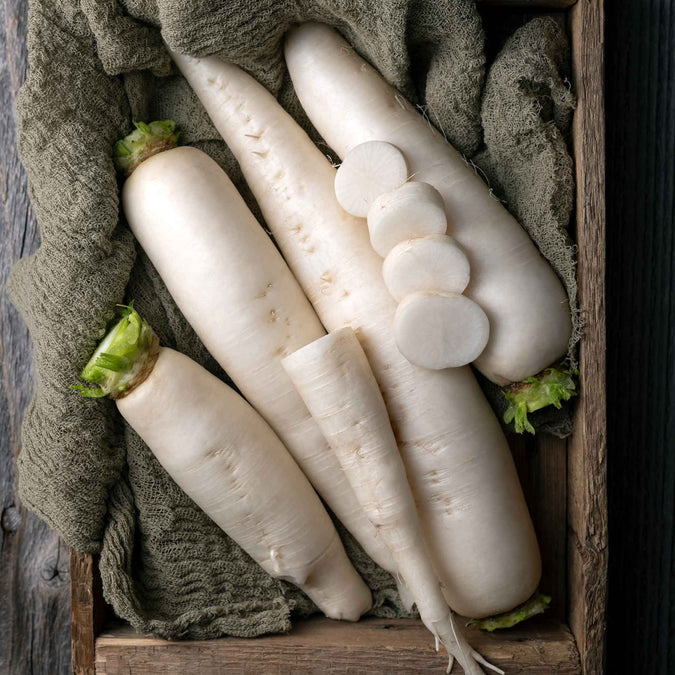
Dharaseeds
Radish Seeds (Organic) - Japanese Minowase Daikon
Estimated Free Delivery between April 16 and April 19.
Secured Payment Methods
Your transaction is protected with advanced security measures to keep your information confidential
The Japanese Minowase Daikon is an organic, large white radish variety known for its mild flavor, crisp texture, and impressive size. This traditional Japanese radish thrives in cooler climates and is a popular choice for those looking to grow daikon for both culinary and health benefits. Its versatility in the kitchen and ease of cultivation make it a must-have for gardeners.
Key Benefits
- Mild Flavor: The Minowase Daikon offers a mild, slightly sweet taste, much less peppery than smaller radish varieties.
- Large Size: Known for growing long, straight roots that can reach up to 12–18 inches in length, making it ideal for slicing, pickling, or grating.
- Nutritional Powerhouse: Rich in vitamin C, fiber, and antioxidants, daikon radishes are known for their health benefits, including aiding digestion and detoxification.
- Culinary Versatility: Used in a wide range of dishes, from fresh salads and soups to traditional Japanese pickles and stir-fries.
- Organic Quality: Grown without synthetic pesticides or fertilizers, ensuring a natural, healthy crop.
Variety Features
- Shape: Long, cylindrical, and smooth, with roots that can grow up to 18 inches or more.
- Color: Bright white, with a crisp texture.
- Flavor: Mild and slightly sweet, ideal for raw or cooked dishes.
- Maturity: Typically ready for harvest in 60–70 days, depending on growing conditions.
Planting Instructions
Best Planting Season
- Japanese Minowase Daikon radishes grow best in cooler weather, so plant in early spring or late summer for fall harvest. They can also tolerate light frost, making them suitable for autumn gardening.
Planting Details
- Sowing Depth: Plant the seeds about 1/2 inch deep into the soil.
- Spacing: Space seeds 2–4 inches apart, with 12–18 inches between rows, to allow for their large size and to avoid overcrowding.
- Soil: Prefers loose, well-draining soil that is rich in organic matter. Ideal soil pH is 6.0–7.0. Adding compost will improve soil quality and encourage healthy growth.
Care Instructions
Watering
- Water the soil consistently, keeping it evenly moist but not soggy. Daikon radishes require plenty of water to grow large, tender roots.
Light
- Full sun is recommended for Minowase Daikon, but they can also tolerate some light shade. Aim for at least 6 hours of sunlight each day to promote healthy growth.
Temperature
- Best grown in temperatures between 50–70°F (10–21°C). Daikon radishes are cool-season crops and grow best when daytime temperatures are not too hot.
Harvesting
When to Harvest
- Harvest when the radishes reach their mature size, typically around 60–70 days after sowing. The root should be firm, smooth, and at least 12 inches long for the best flavor and texture.
- For larger daikons, wait until the roots are thick and mature, but be cautious not to leave them in the ground too long, as they can become woody.
How to Harvest
- Gently pull the radishes from the soil. If the soil is compact, use a hand fork or small spade to loosen the earth around the root to prevent damage.
Storage
- Short-Term: Store in the refrigerator in a plastic bag or container for up to 2–3 weeks. Remove the greens before storing to prevent the radishes from becoming bitter.
- Long-Term: Daikon radishes can be pickled or stored in a cool, dry place for longer storage. You can also freeze daikon, although the texture may change after freezing.
Culinary Uses
- Fresh: Slice and add to salads, sandwiches, or enjoy as a crunchy snack.
- Soups and Stews: Daikon is commonly used in miso soup, broths, and other Asian-inspired dishes.
- Pickled: A traditional use of daikon, particularly in Japanese cuisine. Pickle the radish slices to create a tangy and crunchy side dish.
- Stir-fries: Add daikon to stir-fries for a mild, sweet flavor and crunchy texture.
- Juices: Grated daikon can be used in juices or smoothies for an added nutritional boost.
Conclusion
The Japanese Minowase Daikon is a wonderful choice for gardeners looking for an organic, mild-flavored radish that offers both culinary and health benefits. Its large size, quick growth, and versatility in the kitchen make it an excellent addition to any vegetable garden. Whether you enjoy it fresh in salads, pickled, or in hearty soups, this radish will deliver a refreshing, nutritious bite to your dishes.









